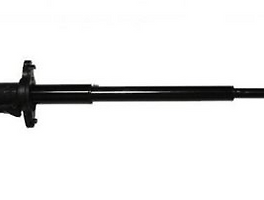여기서도 4k+2만 푼다. (+ Prob 8)
숙제 문제는 6,7,9,17,19,24,32 + Problem 8.
2. (Kernel의 조건이 바뀌면 어떻게 될까?)
Suppose $\{K_\delta\}$ is a family of kernels that satisfies:
- $|K_\delta(x)|\leq A\delta^{-d}$ for all $\delta>0$
- $|K_\delta(x)|\leq A\delta/|x|^{d+1}$ for all $\delta>0$.
- $\int K_\delta = {0}$ (Not 1!!)
Show that if $f$ is integrable on $\mathbb R^d$, then
$$(f\ast K_\delta)(x)\to 0 \textrm{ for a.e. $x$, as $\delta \to 0$.}$$
6. (숙제문제)
In one dimension there is a version of the basic inequality
$$m(\{x\in \mathbb R: f^\ast>\alpha\})\leq\frac{A}{\alpha}\Vert f\Vert_1$$
in the form of an identity. We define the "one-sided" maximal function
$$f^\ast_+(x)=\sup_{h>0}\frac{1}{h}\int_x^{x+h}|f(y)|dy.$$
If $E^+_\alpha=\{x\in \mathbb R: f^\ast_+>\alpha\}$, then
$$m(E^+_\alpha)=\frac{1}{\alpha}\int_{E^+_\alpha}|f(y)|dy.$$
[Hint: Apply Lemma 3.5 to $F(x)=\int_0^x|f(y)|dy-\alpha x$. Then $E^+_\alpha$ is the union of disjoint intervals $(a_k,b_k)$ with $\int_{a_k}^{b_k}|f(y)|dy=\alpha(a_k-b_k)$.]
Proof
10.
Construct an increasing function on $\mathbb R$ whose set of discontinuities is precisely $\mathbb Q$.
14.
The following measurability issues arose in the discussion of differentiability of functions.
- Suppose $F$ is continuous on $[a,b]$. Show that $$D^+(F)(x)=\limsup_{h\to 0+}\frac{F(x+h)-F(x)}{h}$$ is measurable.
- Suppose $J(x)=\sum^\infty_{n=1}\alpha_n j_n(x)$ is a jump function as in Section 3.3. Show that $$\limsup_{h\to 0}\frac{J(x+h)-J(x)}{h}$$ is measurable.
[Hint: For (a), the continuity of $F$ allows one to restrict to countably many $h$ in takeing the limsup. For (b), given $k>m$, let $F^N_{k,m}=\sup_{1/k\leq|h|\leq1/m}\left|\frac{J_N(x+h)-J_N(x)}{h}\right|$, where $J_N(x)=\sum^N_{n=1} \alpha_n j_n(x)$. Note that each $F_{k,m}^N$ is measurable. Then, successively, let $N\to \infty, k\to \infty$, and finally $m\to \infty$.]
18.
Verify the agreement between the two definitions given for the Cantor-Lebesgue function in Exercise 2. Chapter 1 and in Section 3.1 of this chapter.
22.
Suppose that $F$ and $G$ are absolutely continuous in $[-\pi,\pi]$. Show that their product $FG$ is also absolutely continuous. This has the following consequences.
- $$\int^\pi_{-\pi} F'(x)G(x)dx=-\int^\pi_{-\pi} F(x)G'(x)dx+[F(x)G(x)]^\pi_{-\pi}$$
- Let $F(\pi)=F(-\pi)$. Show that if $$a_n=\frac{1}{2\pi} \int^\pi_{-\pi}F(x)e^{-inx}dx,$$ such that $F(x)\sim \sum a_n e^{inx}$, then $$F'(x)\sim \sum ina_ne^{inx}.$$
- What happens if $F(-\pi) \neq F(\pi)$? [Hint: Consider $F(x)=x$.]
26.
외측도를 Cube가 아니라 Ball로 정의하면 어떻게 될까? 그래도 똑같은데, 원래 정의를 $m_\ast$로, Ball로 만든 정의를 $m_\ast^\mathcal B$라고 하면 $m_\ast(E)\leq m_\ast^\mathcal B(E)$는 자명하고, Reverse Inequality를 보여야 한다. 다음을 보여라. $$\sum_j m(B_j)\leq m_\ast(E)+\epsilon$$
Note that for any preassigned $\delta$, we can choose the balls to have diameter $<\delta$.
[Hint: $E$를 열린집합으로 싸매고 적당히 근사되게 finite ball 고르고, 나머지 부분은 cube로 덮고 그걸 ball로 바꾼다.]
30.
$F$가 bounded이고 임의의 Bounded suinterval $[a,b]$에서 유계변동이고 $\sup_{a,b}T_F(a,b)<\infty$이면, $\mathbb R$에서 유계변동이라고 한다. 다음을 보여라.
- $\int_\mathbb{R}|F(x_h)-F(x)|dx\leq A|h|$, for some constant $A$ and all $h\in \mathbb R$.
- $|\int_\mathbb{R} F(x)\varphi'(x)dx|\leq A,$ where $\varphi$ ranges over all $C^1$ functions of bounded support with $\sup|\varphi(x)|\leq 1$.
Prob 8. (숙제문제)
Let $\mathcal R$ denote the set of all rectangles in $\mathbb R^2$ that contain the origin and with sides parallel ot the coordinate axis. Conseider the maximal operator associated to this family, namely
$$f^\ast_{\mathcal R}=\sup_{R\in \mathcal R}\frac{1}{m(R)}\int_R|f(x-y)|dy.$$
- Then, $f\mapsto f^\ast_\mathcal R$ does not satisfy the weak type inequality $$m(\{x:f^\ast_\mathcal R (x)>\alpha\})\leq \frac{A}{\alpha}\Vert f\Vert_1$$
- Using this, one can show that there exists $f\in L^1(\mathbb R)$ so that for $R\in \mathcal R$ $$\limsup_{\textrm{diam}(R)\to 0}\frac{1}{m(R)}\int_R f(x-y)dy=\infty \textrm{ for a.e. $x$.}$$
[Hint: For part (a), let $B$ be the unit ball, and consider the function $\phi(x)=\chi_B(x)/m(B)$. For $\delta>0$, let $\phi_\delta (x) = \delta^{-2}\phi(x/\delta)$. Then $$(\phi_\delta)^\ast_\mathcal R (x)\to \frac{1}{|x_1||x_2|} \textrm{ as $\delta \to 0$,}$$ for every $(x_1,x_2)$, with $x_1x_2 \neq 0.$ If the weak type inequality held, then we would have $$m(\{|x|\leq 1: |x_1x_2|^{-1}>\alpha\})\leq\frac{A}{\alpha}.$$ This is a contradiction since the left-hand side is of the order of $(\log\alpha)\alpha$ as $\alpha$ tends to infinity.]
'기타 > 시험 관련' 카테고리의 다른 글
| Stein 2장 연습문제 (0) | 2024.04.25 |
|---|---|
| 대수학1 중간고사 대비 (0) | 2024.04.24 |
| 미다체 중간고사 복기 (0) | 2024.04.22 |
| 해석학1 중간고사1 복기 (0) | 2024.04.21 |
